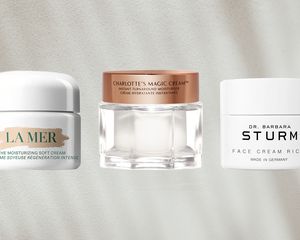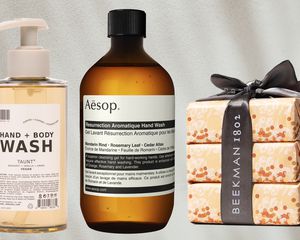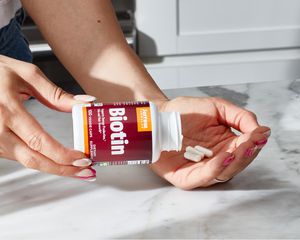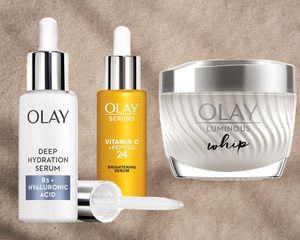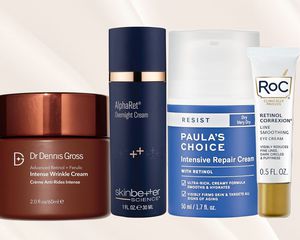:max_bytes(150000):strip_icc()/collagen-1174c19ce8a04d508b4597e448e4d6a1.png)
Stocksy
When it comes to buzzy skincare ingredients, collagen is undoubtedly among them. If you're an anti-aging fanatic, you've heard all about its laundry list of benefits. Among other roles, collagen is the most important structural protein in our skin and is responsible for giving us plump, youthful-looking skin. The caveat? There's a time limit to its bounty. As a result of the natural aging process, and further catalyzed by external factors, collagen breaks down over time. Enter: a whole host of collagen-based products from creams to supplements and their force of marketing teams that claim to restore our diminishing collagen supply.
With all the different forms and types of collagen skincare, things can get pretty confusing. To sort through the facts, we turned to board-certified dermatologists Jeannette Graf and Marie Hayag. Keep reading to find out everything you need to know about collagen, including which products (if any) are even worth trying.
Meet the Expert
- Jeannette Graf, MD, is a board-certified dermatologist and assistant clinical professor at Mount Sinai.
- Marie Hayag, MD, is a board-certified dermatologist and founder of 5th Avenue Aesthetics.
What Is Collagen?
Collagen is often referred to as the body’s scaffolding. Makes sense as it is the most important structural protein in your skin. Not only is collagen made in our bodies, but it can also be derived from plants and animals. It's available in topical and ingestible forms, and in the past, it was also a popular injectable (we'll dive deeper into the different forms a little later on). As far as topicals, collagen is found most commonly in creams or serums, but depending on your intended goal, collagen skincare products might not be as effective as you might think.
Dr. Hayag says not only do we naturally produce less collagen starting in our 20s, but we also lose collagen with age and other factors, like sun exposure, smoking, or sugar intake. In other words, as we age, we lose more collagen than we make. So what's the fix? One idea is to apply collagen to the skin with collagen skincare in an attempt to replenish it, but here's why Dr. Graf says that doesn't quite work: Simply put, the entire collagen molecule is very, very large, and way too big to penetrate the epidermis of the skin. However, as Dr. Graf explains it, hydrolyzed collagen is enzymatically broken down into fragments that have an easier time of getting into the dermis, and therefore, it's actually able to get into the position of where collagen would be. Even still, Dr. Hayag says not enough clinical testing has been done to support the idea that this would lead to making collagen.
Collagen
Type of ingredient: Protein.
Main benefits: Moisturizes the skin.
Who should use it: Dr. Graf says in general, anyone interested in increasing moisture and harnessing anti-aging powers can use collagen skincare.
How often can you use it: According to Dr. Graf, topical collagen, as well as oral collagen, can be used on a daily basis. When applied to the skin, collagen can be used morning, night, or both as it's not sun-sensitizing.
Works well with: Retinoids, Retinol, Peptides, Vitamin C.
Don't use with: In general, collagen is safe to use with most ingredients and topical products. "When you apply hydrolyzed collagen, it gets right into the skin and penetrates rapidly," Dr. Graf explains, and for that reason, she says it shouldn't interfere with any other product or ingredient.
Benefits of Collagen for Skin
According to Dr. Graf, putting collagen into your skin sadly isn't going to stimulate other collagen. However, collagen is known for having great moisturizing benefits when applied topically, so if your nightly routine consists of applying a collagen cream, it's not a total loss. As Dr. Hayag puts it, topical collagen creams are said to improve fine lines and wrinkles by replacing the lost collagen, but in reality, the collagen mostly moisturizes it. Dr. Hayag explains this can make the skin feel softer and smoother, but as far as actually building collagen? Not so much.
Potential Side Effects of Collagen
Despite the fact that your collagen cream or serum, unfortunately, won't turn back time, Dr. Hayag says there's no harm in using one if you like the way it feels and the results you get. However, Dr. Graf points out that it's possible to be allergic to any molecule or any chemical in any skincare product, so if you have a reaction to it, stop using it. And the same goes for supplements. "I would probably recommend finding out where the collagen is derived from," Dr. Graf adds. "If someone is allergic to cow's milk, then they probably should avoid collagen that comes from a cow."
How to Use Collagen
Whether it's an ingestible or topical form of collagen skincare, Dr. Graf says you can use it any time of the day, morning or night. As a moisturizer, collagen cream can be applied either once or twice a day. For either form, it's best to follow the manufacturer's instructions.
Collagen Skincare Cocktailing
If you've been around the skincare and beauty space for a while, you probably already know that it's not just one product that will support and maintain your skin of dreams. Instead, it's an intentional layering or cocktailing of products that work well together and even amplify or promote the other's capabilities. If your ultimate goal of using collagen skincare is to stimulate collagen production, Dr. Hayag recommends boosting your routine with a retinoid or retinol (which she calls the gold standard for boosting collagen) or peptides and growth factors as a less irritating option that can help by acting as “messengers” to signal cells to create collagen. Dr. Hayag also recommends vitamin C (another collagen producer) and sunscreen with UVA protection to prevent your collagen from breaking down further.
Topical Collagen vs. Collagen Supplements
As previously mentioned, collagen is also available in an oral form to improve hair, nails, and in the interest of this article, skin. Despite the claims, which range from glowing skin to improved wrinkles and skin elasticity, Dr. Hayag says the studies to back them up are limited; however, between collagen creams and collagen supplements, Dr. Hayag believes the oral version would be the most beneficial to the skin. With that said, there are things to keep in mind when selecting a product. As is the case with all supplements, oral collagen isn't FDA-regulated, which is why it's important to always consult your physician before making any changes to your regimen. In general, Dr. Hayag says to be wary of any products that contain animal by-products and look for supplements with collagen types I and III that comes from a cage-free, free-range, and antibiotic-free source.
Other Forms of Collagen for Skin
Oh, and about those collagen injections. Circa 1980s, before hyaluronic acid fillers were the top choice, collagen injectable fillers were used to soften wrinkles and plump up lips. They've since been replaced by longer-lasting hyaluronic acid fillers, which Dr. Hayag says are less allergenic.
The Takeaway
So what's the final verdict? Do you actually need to be taking a collagen supplement? The answer isn't totally clear. According to Dr. Hayag, if you're eating a normal balanced diet that includes protein-rich foods, like meat, eggs, dairy, and beans, oral collagen supplements likely aren't necessary. Dr. Graf, on the other hand, says they could potentially be beneficial. "It does benefit the skin, but it also benefits other things internally, like joints, that a topical doesn’t." And if you don't need it, well, Dr. Graf says your body won't absorb it and will excrete any over-supplementation.
As for topical collagen creams and serums, they likely aren't generating new collagen synthesis if they don't have the right ingredients (retinoids, peptides, growth factors), but if you like the way they feel, keep on slathering. Plus, they tend to be moisturizing which can impart a more short-term smooth and plump appearance. Most importantly, you should be protecting the collagen that you do have by wearing sunscreen and continuing to take care of your skin.
